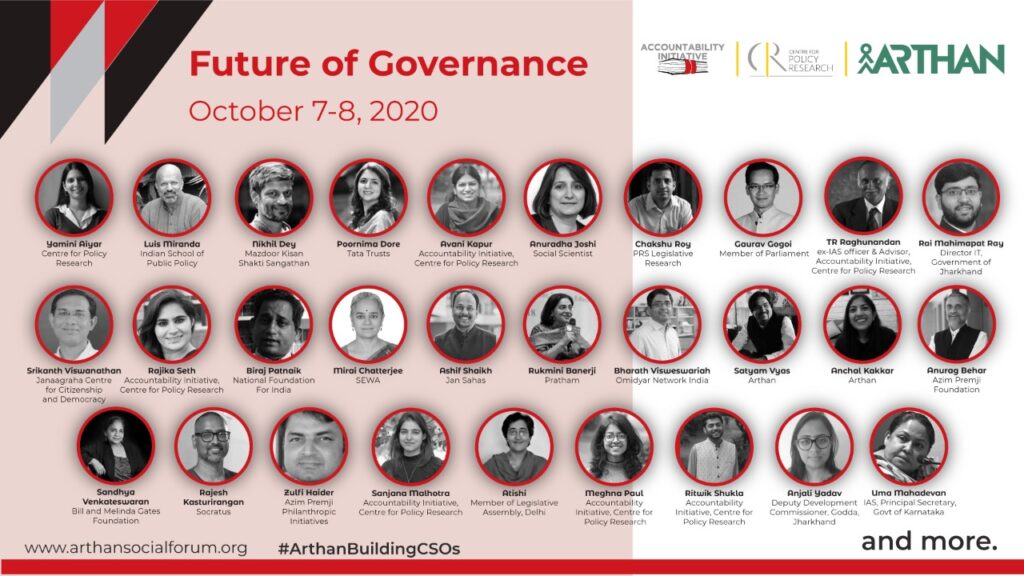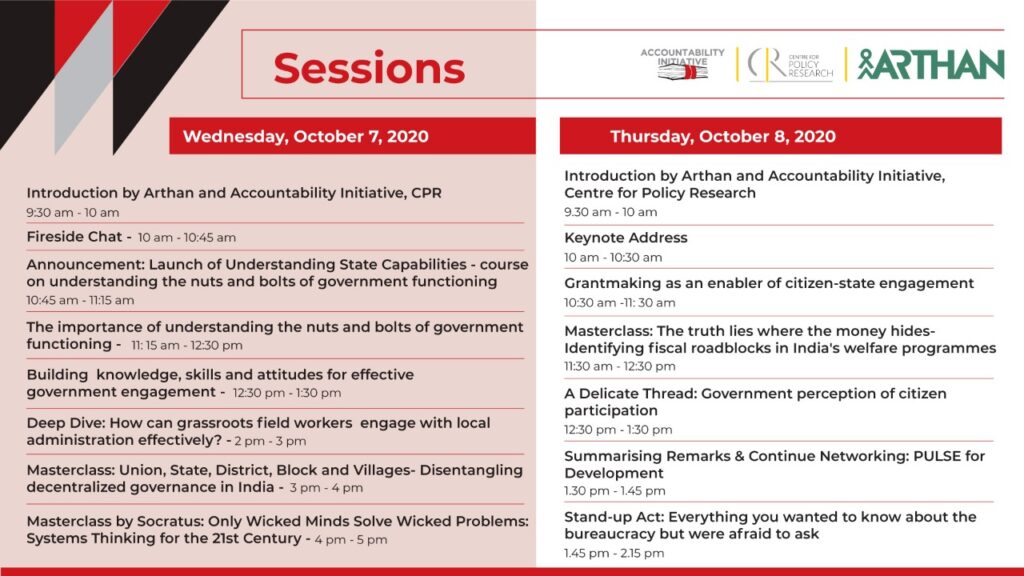The Future of Governance Exclusive Forum
Wednesday, 07 October 2020 ADD TO CALENDAR
9:15 AM To 5:30 PM
With over Rs 20 lakh crores (USD 300 billion) announced by the Union government alone as part of COVID-19 relief measures, the crisis has not only increased but also laid bare the number of citizens dependent on government relief measures. As we await the short and long term effects of the pandemic, Civil Society Organisations (CSOs) are already playing a critical role in ensuring that the vulnerable communities are identified and reached. In fact, India is estimated to have over 3.3 million Non-Government Organisations (NGOs), many of whom work at the last mile.
Critical in the ability of CSOs to effectively engage with government authorities and serve vulnerable communities is for them to have the right tools and information.
The Future of Governance is a virtual forum, curated by Accountability Initiative at the Centre for Policy Research, and will be co-hosted with Arthan. The panels will span two days (7 Oct-8 Oct).
To attend the forum all you have to do is send us a mail at: socialmedia@accountabilityindia.org.
Why are we doing this?
A pan-India survey of over 160 CSOs conducted by PRIA about their upcoming interventions and challenges revealed that: 30% CSOs would be involved in enabling access to government schemes; 26% would be involved in advocacy with government agencies; and 15% would monitor government programmes. One of the biggest challenges, however, faced by a majority (93%) was coordinating with the government. Importantly, 58% asked for access to knowledge as a crucial capacity need.
The Accountability Initiative at the Centre for Policy Research has been researching and studying the nuts and bolts of government functioning for over 10 years. In the current context, it is imperative that accessible, relevant and applicable information on government functioning is available to all CSOs who are either directly engaging with the government or working to complement government efforts in ensuring access.
There are three critical interrelated pieces of information on government functioning that all development professionals should know. These are:
- Information on flow of funds in government programmes
- Information on administrative structure across levels of government
- An understanding of the local self-government itself, which is usually the first point of contact for most citizens
The Future of Governance virtual forum curated by us and co-hosted with Arthan, will not only engage with the WHY of government engagement but also talk about HOW this can be made possible.
Sessions/Day 1
Introduction to Building Civil Society Organisations of the Future and this Forum
Time: 09:30-10:00 AM
By Avani Kapur of Accountability Initiative, Satyam Vyas and Anchal Kakkar of Arthan
Fireside chat
Time: 10:00-10:45 AM
Anurag Behar of Azim Premji Foundation in conversation with Yamini Aiyar of Centre for Policy Research
Announcement
Time: 10:45-11:15 AM
Launch of Understanding State Capabilities, a course on understanding the nuts and bolts of government functioning
Panel 1: The importance of understanding the nuts and bolts of government functioning
Time: 11:15 AM-12:30 PM
While it has been generally accepted that collaboration between civil society and the government is critical for the delivery of quality public services, there still exist challenges on both sides to make this relationship strike. One challenge for the development sector is the lack of understanding of government systems and processes.
With this panel, we aim to bring together professionals to talk about why the development sector needs to lay more emphasis on understanding the ‘nuts and bolt of government functioning’ to be able to engage with the government more effectively.
Panelists:
- Nikhil Dey, Mazdoor Kisan Shakti Sangathan
- Luis Miranda, Indian School of Public Policy
- Poornima Dore, Tata Trusts
- Moderator: Avani Kapur, Accountability Initiative, Centre for Policy Research
Panel 2: Building knowledge, skills and attitudes for effective government engagement
Time: 12:30-1:30 PM
There are three critical interrelated pieces of information on government functioning that all development professionals should know- information on the flow of funds in government programmes; information on administrative structure across levels of government; and an understanding of the local self-government itself, which is usually the first point of contact for most citizens.
This panel will address specific capacity gaps in engaging with the government with respect to the above-mentioned points. It will also breakdown the different stakeholders in the development ecosystem, their specific challenges and capacity requirements.
Panelists:
- Anuradha Joshi, Social Scientist
- Chakshu Roy, PRS Legislative Research
- Srikanth Viswanathan, Janaagraha Centre for Citizenship and Democracy
- Moderator: Rajika Seth, Accountability Initiative, Centre for Policy Research
Panel 3: Deep Dive: How can grassroots field workers engage with local administration effectively?
Time: 2:00-3:00 PM
In combatting the COVID-19 pandemic, the role of grassroots organisations has been key in ensuring that vulnerable communities are able to access government services. It is these grassroots professionals, often known as our ‘field workers’, whose skills and ability to navigate government systems have been put to test.
Recognising the urgent need to empower these last-mile soldiers, this panel will discuss how to ensure our professionals have the right tools and information to effectively engage with government authorities and serve vulnerable communities.
Panelists:
- Ashif Shaikh, Jan Sahas
- Biraj Patnaik, National Foundation of India
- Mirai Chatterjee, SEWA
- Moderator: Rukmini Banerji, Pratham
Masterclass 1: Union, State, District, Block and Villages: Disentangling Decentralised Governance in India
Time: 3:00-4:00 PM
By Rajika Seth and Sanjana Malhotra of Accountability Initiative, Centre for Policy Research
Masterclass 2: Only Wicked Minds Solve Wicked Problems: Systems Thinking for the 21st Century
Time: 4:00-5:00 PM
By Rajesh Kasturirangan of Socratus
In a snapshot/Right click to save, download & share
Speakers:

Sessions:

*Note: All timings are IST
Sessions/Day 2
Introduction & Opening Remarks
Time: 9:30-9:50 AM – Arthan and the Accountability Initiative, CPR
Time: 9:50-10.00 AM – Dr. Meenakshi Gopinath, Opening Remarks
Keynote Address: Atishi Marlena, Member of the Delhi Legislative Assembly
Time: 10:00-10:30 AM
Panel 4: Grantmaking as an enabler of citizen-state engagement
Time: 10:30-11:30 AM
This includes building trust, collaboration, and capacity among citizens/civil society organisations as well as the government machinery to be able to engage with each other more effectively.
Panelists:
- Bharath Visweswariah, Omidyar Network India
- Sandhya Venkateswaran, Bill and Melinda Gates Foundation
- Zulfiquar Haider, Azim Premji Philanthropic Initiatives
- Moderator: Avani Kapur, Accountability Initiative, Centre for Policy Research
Masterclass 3: The truth lies where the money hides: Identifying fiscal roadblocks in India’s welfare programmes
Time: 11:30 AM-12:30 PM
By Meghna Paul and Ritwik Shukla of Accountability Initiative, Centre for Policy Research
Panel 5: A Delicate Thread: Government perception of citizen participation
Time: 12:30-1:30 PM
Is government perception of citizen participation open or closed? Real or fake? Invited or claimed? What challenges of citizen engagement do they foresee?
The government in the past many years has opened many channels for citizens to engage with government processes from adopting successful citizen-led pilots to introducing more formal structures of engagement like social audits. The recently released National Education Policy had also solicited suggestions from citizens.
This panel will discuss the extent to which these doors of engagement are accessed by citizens focussing on capacity (ability and attitude) of government functionaries to leverage citizen participation.
Panelists:
- Gaurav Gogoi, Member of Parliament
- Rai Mahimapat Ray, Director, Information Technology and e-Gov, Government of Jharkhand
- Anjali Yadav, Deputy Director, Development Commissioner Godda, Jharkhand
- Uma Mahadevan, Principal Secretary, Rural Development and Panchayati Raj Department, Government of Karnataka
- Moderator: T.R. Raghunandan, Ex-IAS Officer and Advisor, Accountability Initiative at the Centre for Policy Research
Summarising Remarks and Introduction to PULSE Platform for Development
Time: 1:30-1:45 PM
Stand-Up Act: Everything you wanted to know about the bureaucracy but were afraid to ask?
Time: 1:45-2:30 PM
A stand-up act by former IAS officer TR Raghunandan to take you deeper into the world of bureaucrats and bureaucratic functioning.
Your takeaways
- What the government system looks like from the inside.
- The role citizens can play in the government system.
- Roadblocks in the intended purpose and structure of welfare schemes.
- Knowledge, skills and attitudes required to engage with the government more effectively
*********
If you are a journalist and would like to cover the event, the Press Release is available here.
*********
To attend the forum all you have to do is send us a mail at: socialmedia@accountabilityindia.org.

